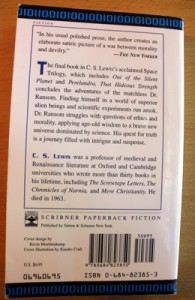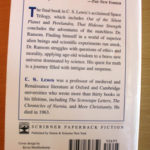On The Back Cover 2
 Have you ever found a fascinating-looking book, at least judging from its cover, on a shelf — picked it up, admired, then flipped it over — then read something like this?
Have you ever found a fascinating-looking book, at least judging from its cover, on a shelf — picked it up, admired, then flipped it over — then read something like this?
PRAISE FOR JAMES P. SWANMINGLER
“Incredible . . . Swanmingler does it again . . . lace up your boots and unlace other garments, because it’s going to be a steamy ride.”
— The Library Foundlings Society
“Wow. Just wow. I couldn’t put it down . . . the delicate romance of a Clancy thriller, the jovial simplicity of a Tolkien legendarium.”
— The Minnesota Statesman-Inquisition, Featured Book Review
“The autumn blockbuster is back, and you’ll feel the chills and make the autumn wind yourself by how fast you’ll be turning these colorful pages. Swanmingler is once again at the top of his seasonal game.”
— The New Jersey Port Authority Herald
“A first-class shiner.”
— Eddie Bowtruckle, author of Blood Omenship, Swoon of the Moon, and Sunken Decks of the Dead
In a bookstore not long ago, I found such a book, and was struck by a total lack of what I had wanted to find: something about the story. The author’s name was new to me. Already the publisher, graphic designer, and/or cover artist had made the “sale.” I wanted to know some about the imagination behind that fantastic cover.
So what was the novel’s actual story? A dark secret to be sought within, I guess. Now look at me. I can’t even recall what on the cover was so impressive. It’s gone.
Naturally, I had to write my own endorsement, inside 119 characters:
When I pick up a novel to read its back cover, don’t give me Endorsements about the Product. Tell me about the *story*.

'That Hideous' back cover.
Some back covers, of course, get the story very wrong. I suppose I would prefer reading no plot description, over an inaccurate plot description. For example, an edition of That Hideous Strength by C.S. Lewis says: “Finding himself in a world of superior alien beings and scientific experiments run amok, Dr. Ransom struggles with questions of ethics and morality, applying age-old wisdom to a brave new universe dominated by science.” I have no idea what that’s talking about. The only accuracies were “Dr. Ransom” and “scientific experiments.” I suppose you could say that summary is spoiler-free.
Other back covers flagrantly reveal real spoilers. Readers, and I’m sure authors, may get frustrated by this. Back-cover spoilers have ruined more than a few books for me. Still, come to think of it, they may keep someone reading. When’s the part when X occurs?
But presenting only vague endorsements doesn’t work for me. I can’t recall any time when they did. Perhaps I have read too many books, endorsed by authors whose works I loved, that ended up not being as good as those novels. More likely, I simply don’t know that author or care for the publication that is named. And I have to wonder:
- Without reading the newspaper review, what does its excerpted opinion matter to me? Especially when it’s not the newspaper, but one reviewer, who said that?
- If the story is good, does the author really need “propping” from another, more-popular author who got there first? This practice may come across as humble, and I don’t want to oppose that! Yet I wonder whether statistics or anecdotes would support the concept of one author’s fans “transferring” to another author.
- Any new author is not C.S. Lewis, or anyone else. Please, cut out this comparison.
- Endorsements aside, why not at least tell me something about the novel’s story?
Really, I keep coming back to that last question.
Maybe you do, too. Or perhaps you find a lot more attractive about the endorsements, at least those from other fiction authors, than I do.
Perhaps I have something to learn here, from other readers who can share what they like, or from authors or editors stopping by who know more about the reasons for publishers preferring back-cover endorsements over story summaries.
Or perhaps you only want to reply with something specific and helpful, like this:
“Wonderful column. Burnett does it again. I couldn’t put it down. You have done excellent explorations to the topic.”






































Having endorsements instead of a hook doesn’t necessarily bug me, personally…mostly because so many hooks are no good. They can be cheesy, or so vague that in the end I don’t know anything about the story ANYWAY. Often they play up some cliched aspect of the plot – the part that’s been done to death, even if the book has its own unique twist on the story – and I’m left thinking, “Eh, this is just another prophesied hero fantasy [or whatever]. Pass.” In order for a hook to hook me, it has to be interesting and fresh.
I don’t always read the back cover, mostly because I fear spoilers. If I’m on the fence, an endorsement by someone I’m a fan of might send me over. . Normally I look at the front cover: title & imagery. Course, if I know the author it’s kind of “Oh, look another X book….cool.” Cuz I tend to…find an author and read everything with their name on it.
Amen. If I find only endorsements on the back cover, I generally turn to the front flap (hardcovers) tos see if the description migrated there. If not, I flip through the first few pages to see what it looks to be about. But of the books I have now acessible, only three have no summery whatsoever–The Collected Poems of T.S. Eliot, The Collected Poems of G.K. Chesterton, and G.K. Chesterton’s biography of Charles Dickens. Of course, they don’t have any endorsements either. I do have a few books where the endorsements are longer then the summery, but it does have at least have one.
I usually ignore blurbs, because most of the books I read have been recommended and partially described by my friends. (Or I thought the front cover looked cool. Who doesn’t judge books by their covers?) But I’m glad I read the inside flap for The Hunger Games, because I was the only one of my peer group who knew Katniss was a girl before the Reaping.
The only thing worse than books covered in blurbs are paperbacks covered in blurbs. Because there’s no plot summary at all.
Our library YA paperback rack has a million copies of Sabriel by Garth Nix. I vaguely remember having it recommended to me at one point, but it’s covered in blurbs. No plot summary whatsoever. I had to go to Amazon to find out that it’s a story about good-guy necromancers who use their powers to keep the undead in check.
But yes. Talk about frustrating. Blurbs saying “it’s a great dark fantasy!” don’t tell me if I want to read it.
I totally agree. Endorsements do nothing for me. They don’t even prompt me to buy the book. Word of mouth from friends do. But what I do want to see is what the book is about.
From Kessie:
Yes, and you can’t flip to the inside front cover, as you might be able to, with a paperback.
From Bethany:
That’s where I’m sure writing back-cover copy becomes very difficult. You don’t want to give everything away, but you also don’t want to repeat something a reader has already heard many times before. Moreover, you don’t want to — or should not want to — say something vague. Then everything changes. … Then she is thrust into a battle she had never anticipated. … Until his world is forever altered by the unexplainable.
No, author/publisher. Explain some! At least a little. But not too much.
… Again, I’m sure that’s where it gets complicated.
Yet I feel even a vague or cliched summary is better than another “X has done it again.”
I have a copy of Out of The Silent Planet, the back cover of which claims Ransom was abducted by aliens… I read that before I read the story and kept waiting for the moment that it would be reveled that his captors were actually aliens and not “bent” humans… and that point never came.
I understand not wanting spoilers on the cover, but putting false information is just very wrong.
If I decide to read a book because of a friend’s recommendation I usually will dive right in oblivious to the writing on the cover. If I enjoy the story the cover will have to wait till I’m through. If I’m not sure if I like the story or want to keep reading then I will pause to gather all the available information to inform that decision. But if a book comes to my attention without the endorsement of someone I trust, then I read the whole cover, and whatever is on the inside flaps- and the first page of the fist chapter to decide if I will purchase or borrow the book.
I want the cover to tell me enough about the story to give me an idea if I will like it or not, but not enough to kill the plot suspense for me. I dislike opinions on the cover. Whether a specific person I do not personally know liked a book or not is irrelevant to me. Comparisons could be helpful, except from my experience they usually turn out to be false. Logically if one author tells stories of similar style to another that I know I like, then the chances I will like this one too increase… unfortunately the comparisons are just hype- take the name of a popular author and claim this unknown author writes that kind of story- yeah, right. What I need on the cover is something more helpful than the broad (and inaccurate) categories at my favorite book seller.
I’d forgotten about that error.
[spoiler]When I first read the book, I was stunned when I found that Ransom was actually kidnapped by bent men, as you said, and the aliens were good.[/spoiler]
I suppose this at least preserved an important plot point.
What I most dislike about endorsements is the flowery, often ridiculous language. It often seems like the reviewer was so inspired by the book they’re describing that they try to write their own literary marvel. If you actually read the endorsement, you’ll wonder what exactly they mean.
One that bugs me is the review on the back of Urchin and the Riding Stars. I don’t remember the exact wording, but it goes something like this: “Readers will find it hard not to root for little Urchin and his friends when a very big evil threatens their world.” This is a book for pre-teens, not preschoolers. The condesencion and cutesy-wutsiness are unnecessary.
Obviously, there are pros and cons to endorsements, but to me the value in this column is that E.Stephen Burnett puts the issue in perspective in a very entertaining way. As a new author, that’s what I appreciate. (Oh, my! That’s sounds like I’ve just written him an endorsement)
(First, a terminology issue: several comments have referred to “blurbs” as distinguished from plot summaries, and as if they’re the same thing as the “endorsements.” In the usage I’ve met, the “blurb” is the plot summary.)
In re paperbacks with no blurb on the back cover, only endorsements: Some paperbacks (it depends on the publisher, I suppose) put a blurb—or at least a blurb-ish excerpt—on the first page inside the front cover. (And some paperbacks, with or without a blurb, include several pages of endorsements either there or after the title page.)
If handled properly, quotes from newspaper (or other) reviews of the book, or of the author’s other work, could be very helpful. (The second of the four examples at the start of the post is almost useful; the only problem is that I can’t tell what it means specifically enough.) They can say, better than the blurb can (because the blurb is probably a creation of the marketing department and may, as noted above, be fabricated out of whole cloth), what sort of book this is (more specifically than “fantasy”, or “high fantasy”, or even “mythopoeic fantasy”) and what sort of reader it best appeals to (“readers who thought Tolkien was too terse and simplistic …”). But, alas, even when the review is good the marketing department seems to pick the briefest and most vaguely glowing terms rather than anything of substance. (I’ve noticed that, after the cover artists, the marketing department seems to be the part of the mainstream publishing process that authors complain about most …)
I love well-written blurbs but they’re rather rare. Endorsements are good if they’re relevant, tell the truth and are quality, otherwise they’re pointless. There are some author endorsements that encouraged me not to read the book but for some reason I did anyway – Eragon by Christopher Paolini (endorsed by Anne McAffrey). I suppose purple prose authors should support each other. 😛